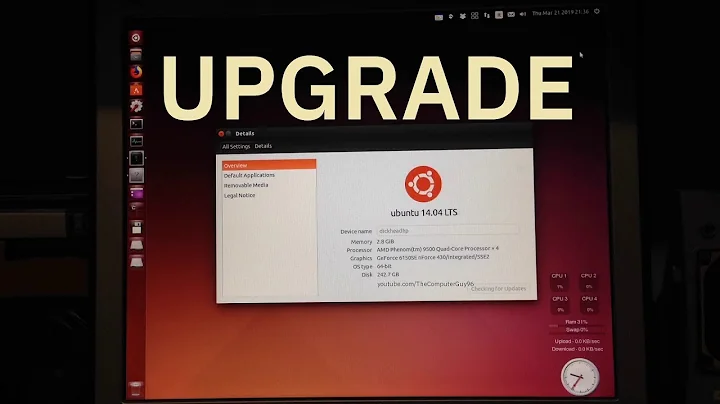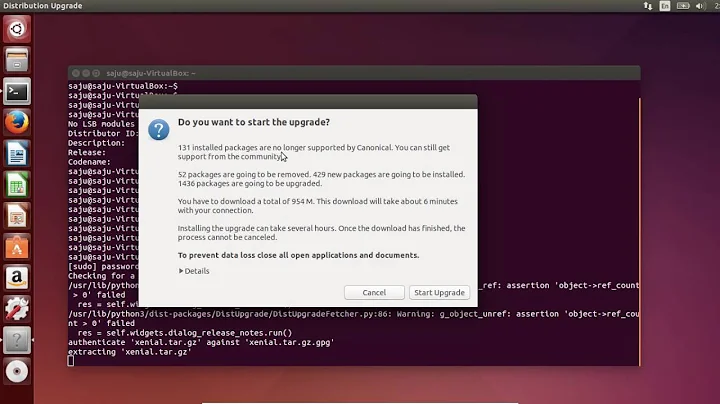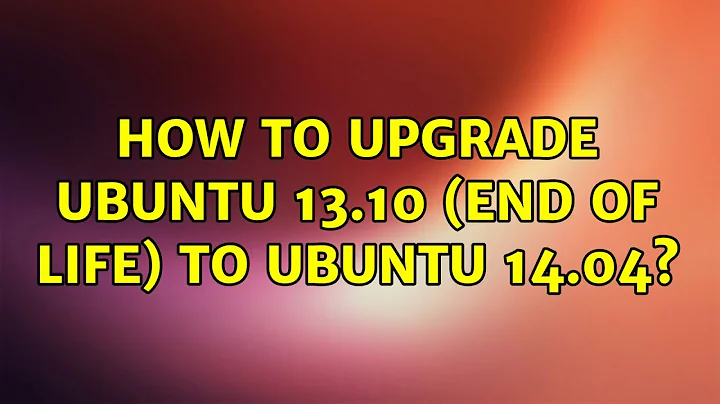How to upgrade Ubuntu 13.10 (end of life) to Ubuntu 14.04?
The safest way to upgrade from 13.10 to 14.04 is by doing the following in a Terminal, thus:
a) do a CTRL + ALT + T to open a Terminal
b) type the following commands:
sudo apt-get update
to update your packages lists
sudo apt-get dist-upgrade
to make sure your system is fully up-to-date before proceeding to the release upgrade
finally:
sudo update-manager -d
non-graphical alternative (all within the Terminal):
sudo do-release-upgrade
c) The update manager will show a button to do the upgrade to Ubuntu 14.04. Click on it and follow the instructions.
WARNING! BEFORE UPGRADING! Please do a backup of your data... just in case!
Related videos on Youtube
Ravi
Updated on September 18, 2022Comments
-
Ravi over 1 year
I've EOL release of Ubuntu 13.10. Now I want to upgrade to next release. For this I read many sites. So herein I would like to clarify & confirm ways for the same.
1) This site of ubuntu mentions how to upgrade from 8.10 to 9.04.
It says to make sure the sources.list (/etc/apt/sources.list) has the following:
## EOL upgrade sources.list # Required deb http://old-releases.ubuntu.com/ubuntu/ intrepid main restricted universe multiverse deb http://old-releases.ubuntu.com/ubuntu/ intrepid-updates main restricted universe multiverse deb http://old-releases.ubuntu.com/ubuntu/ intrepid-security main restricted universe multiverse # Optional #deb http://old-releases.ubuntu.com/ubuntu/ intrepid-backports main restricted universe multiverse #deb http://old-releases.ubuntu.com/ubuntu/ intrepid-proposed main restricted universe multiverseNow my sources.list in 13.10 has the following. It doesn't have the words "universe multiverse" as is mentioned above.
# deb cdrom:[Ubuntu 13.10 _Saucy Salamander_ - Release i386 (20131016.1)]/ saucy main restricted # See http://help.ubuntu.com/community/UpgradeNotes for how to upgrade to # newer versions of the distribution. deb http://in.archive.ubuntu.com/ubuntu/ saucy main restricted deb-src http://in.archive.ubuntu.com/ubuntu/ saucy main restricted ## Major bug fix updates produced after the final release of the ## distribution. deb http://in.archive.ubuntu.com/ubuntu/ saucy-updates main restricted deb-src http://in.archive.ubuntu.com/ubuntu/ saucy-updates main restricted ## N.B. software from this repository is ENTIRELY UNSUPPORTED by the Ubuntu ## team. Also, please note that software in universe WILL NOT receive any ## review or updates from the Ubuntu security team. deb http://in.archive.ubuntu.com/ubuntu/ saucy universe deb-src http://in.archive.ubuntu.com/ubuntu/ saucy universe deb http://in.archive.ubuntu.com/ubuntu/ saucy-updates universe deb-src http://in.archive.ubuntu.com/ubuntu/ saucy-updates universe ## N.B. software from this repository is ENTIRELY UNSUPPORTED by the Ubuntu ## team, and may not be under a free licence. Please satisfy yourself as to ## your rights to use the software. Also, please note that software in ## multiverse WILL NOT receive any review or updates from the Ubuntu ## security team. deb http://in.archive.ubuntu.com/ubuntu/ saucy multiverse deb-src http://in.archive.ubuntu.com/ubuntu/ saucy multiverse deb http://in.archive.ubuntu.com/ubuntu/ saucy-updates multiverse deb-src http://in.archive.ubuntu.com/ubuntu/ saucy-updates multiverse ## N.B. software from this repository may not have been tested as ## extensively as that contained in the main release, although it includes ## newer versions of some applications which may provide useful features. ## Also, please note that software in backports WILL NOT receive any review ## or updates from the Ubuntu security team. deb http://in.archive.ubuntu.com/ubuntu/ saucy-backports main restricted universe multiverse deb-src http://in.archive.ubuntu.com/ubuntu/ saucy-backports main restricted universe multiverse deb http://security.ubuntu.com/ubuntu saucy-security main restricted deb-src http://security.ubuntu.com/ubuntu saucy-security main restricted deb http://security.ubuntu.com/ubuntu saucy-security universe deb-src http://security.ubuntu.com/ubuntu saucy-security universe deb http://security.ubuntu.com/ubuntu saucy-security multiverse deb-src http://security.ubuntu.com/ubuntu saucy-security multiverse ## Uncomment the following two lines to add software from Canonical's ## 'partner' repository. ## This software is not part of Ubuntu, but is offered by Canonical and the ## respective vendors as a service to Ubuntu users. # deb http://archive.canonical.com/ubuntu saucy partner # deb-src http://archive.canonical.com/ubuntu saucy partner ## This software is not part of Ubuntu, but is offered by third-party ## developers who want to ship their latest software. deb http://extras.ubuntu.com/ubuntu saucy main deb-src http://extras.ubuntu.com/ubuntu saucy mainSo, do I need to include those words in my sources.list or simply I replace the current codename "saucy" to "trusty" other than replacing "archive.ubuntu.com" to "old-releases.ubuntu.com". Please clarify the codename of 14.04 to be used in the sources.list, is it "trusty" (I feel so) or "trusty tahr". If the code name to be used is "trusty", then I don't know why this Ubuntu site mentions it's codename as "trusty tahr"!!!! Also as the 1st link explains, is it O.K. that I delete all lines from my sources.list (in 13.10) & only include the stated 8 sentences (obviously by replacing with the relevant codename) as mentioned in the 1st code of this Q?
2) Now that 1st link says to run the below commands.
sudo aptitude update && sudo aptitude safe-upgrade sudo do-release-upgradeThat's all! But this link of Ubuntu also states of installing some meta-packages/dependencies. Please clarify what's these dependencies & is it reqd. to install these? If reqd. then why that link (1st link of upgrading from 8.10 to 9.04) doesn't mention this?
3) Also, one more point I would like to clarify. See rather than doing via cli, I'm getting a way to do via GUI. See if I only replace archive.ubuntu.com to old-releases.ubuntu.com then when I run "software updater", it has option to upgrade as shown below.
 So, can my system be upgraded this way even? I'm asking this because I couldn't find this method mentioned for upgrading EOL.
So, can my system be upgraded this way even? I'm asking this because I couldn't find this method mentioned for upgrading EOL.4) This is my last point to ask. (Sorry for extending this thread) Once I run the command to upgrade sudo do-release-upgrade via cli or if I click the "Upgrade" button on the GUI of the updater, is it possible that it doesn't require my intervention or input anymore (assuming no error occurs) to complete the upgrade so that I can run the upgrade process in the night before going to sleep & when I get up it should be done?
-
Ravi over 9 years@bain no it's not duplicate.I've visited many sites including the one you mentioned, then only I've come here to ask my Q. My Q isn't answered anywhere, please go through the Q properly to get what I'm asking. I would like if the label in the beginning of my Q can be removed please.
-
bain over 9 yearsBy the way, it is better to ask separate questions, one AskUbuntu question for each question, instead of combining questions together.
-
Ravi over 9 years@bain it's not duplicate at all. That top voted answer mentions modifying sources.list but I'm asking something else with respect to that only. Yes yes yes, w.r.t. that answer that you mentioned, I'm asking my further doubt. I know that answer says replace archive.ubuntu.com with 'blah blah blah', but my Q is further to that. If you have answer please reply to my 1st Q. I request you please read it properly & say whether I need to include those words. That link is not on how to upgrade to new release but the link in that link is! I followed that inside link of help.ubuntu.com
-
Ravi over 9 years@bain the questions go well with the heading (how to upgrade). Including the 1st 3 questions together really should clarify the issue better; making them separate in different threads won't!
-
bain over 9 years1. Replace "archive.ubuntu.com" with "old-releases.ubuntu.com" (this is covered in the other question) 2. You do not need to add any extra packages or do anything else. 3. The system already found the update. Just click "Upgrade" (this is covered in the other question). 4. Upgrading is automatic (unless you made any incompatible changes, in which case it will fail).
-
Ravi over 9 years1. Replacing "that" with "that" is what I've mentioned to do. But what I wanted to know was that my sources.list doesn't have these 2 words namely "universe multiverse" but the ubuntu site (1st link) mentions these 2 words also in the sources.list file. So, I want to know whether I should simply replace what you told or additionally I need to add these words in my file. Replacing "this" with "that" is covered in the other Q but in a different context & not upgrading to next release. My 1st link covers that point. 3. You say click "Upgrade". That Q doesn't cover this point also.That's different
-
bain over 9 years1. You do not need to add "universe multiverse". Why are you looking at a page about upgrading from 8.10 to 9.04? You are not using 8.10, and you are not upgrading to 9.04 2.
Replacing "this" with "that" is covered in the other Q but in a different context & not upgrading to next release- read the whole answer - it does cover upgrading to the next release. 3. The answer includes this image It is not exactly the same but it tells you to click "Upgrade" and it is pretty obvious that you should (how else would you start an upgrade?)
-
-
Ravi over 9 yearsSorry your way is not applicable here as mine is EOL or end of life.
-
 Manu over 9 yearsIf your release is at EOL, the first two commands won't work, indeed, as the repositories have been deactivated. In that case, your only options are the last commands: sudo update-manager -d OR sudo do-release-upgrade.
Manu over 9 yearsIf your release is at EOL, the first two commands won't work, indeed, as the repositories have been deactivated. In that case, your only options are the last commands: sudo update-manager -d OR sudo do-release-upgrade. -
 Manu over 9 yearsFor your convenience, I recommend the first one of the two: sudo update-manager -d
Manu over 9 yearsFor your convenience, I recommend the first one of the two: sudo update-manager -d




